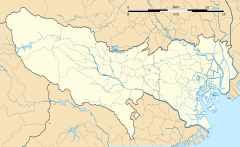Tabata Station (Tokyo)
JY09 JK34 Tabata Station 田端駅 | ||||||||||||||||||||
|---|---|---|---|---|---|---|---|---|---|---|---|---|---|---|---|---|---|---|---|---|
 The north entrance in June 2010 after rebuilding | ||||||||||||||||||||
| General information | ||||||||||||||||||||
| Location | 1 Tabata, Kita City, Tokyo Japan | |||||||||||||||||||
| Coordinates | 35°44′16″N 139°45′41″E / 35.737909°N 139.761254°E | |||||||||||||||||||
| Operated by | ||||||||||||||||||||
| Line(s) | ||||||||||||||||||||
| Platforms | 2 island platforms | |||||||||||||||||||
| Tracks | 4 | |||||||||||||||||||
| Connections | ||||||||||||||||||||
| Construction | ||||||||||||||||||||
| Structure type | At grade | |||||||||||||||||||
| Other information | ||||||||||||||||||||
| Station code |
| |||||||||||||||||||
| History | ||||||||||||||||||||
| Opened | 1 April 1896 | |||||||||||||||||||
| Passengers | ||||||||||||||||||||
| FY2013 | 45,116 daily | |||||||||||||||||||
| Services | ||||||||||||||||||||
| ||||||||||||||||||||
| ||||||||||||||||||||
Tabata Station (田端駅, Tabata-eki) is a railway station in Kita, Tokyo, Japan, operated by East Japan Railway Company (JR East). Tabata Station is on the Tōhoku Main Line and Yamanote Line and is served by the circular Yamanote Line trains and the local and rapid trains of the Keihin–Tōhoku Line.
Station layout
The station consists of two island platforms serving four tracks, with the Yamanote Line tracks on the inside, and Keihin-Tōhoku Line tracks on the outside, enabling cross-platform interchange between the two lines. There is a south and a north exit from the station.
Platforms

| 1 | JK Keihin-Tōhoku Line | for Akabane, Urawa, and Omiya |
| 2 | JY Yamanote Line | for Ikebukuro and Shinjuku (Anti-clockwise) |
| 3 | JY Yamanote Line | for Ueno, Tokyo, and Shinagawa (Clockwise) |
| 4 | JK Keihin-Tōhoku Line | for Ueno, Tokyo, and Yokohama |
Chest-high platform edge doors were installed on the Yamanote Line platforms in January 2015, with operation commencing in February.[1]
History
Tabata Station opened on 1 April 1896.[2] With the privatization of JNR on 1 April 1987, the station came under the control of JR East.[2] The station was rebuilt between 2005 and August 2008.
Station numbering was introduced in 2016 with Tabata being assigned station numbers JY09 for the Yamanote line and JK34 for the Keihin-Tōhoku line.[3][4]
Passenger statistics
In fiscal 2013, the station was used by an average of 45,116 passengers daily (boarding passengers only), making it the 98th busiest station on the JR East network.[5] The passenger figures for previous years are as shown below.
| Fiscal year | Daily average |
|---|---|
| 2000 | 36,555[6] |
| 2005 | 41,400[7] |
| 2010 | 43,208[8] |
| 2013 | 45,116[5] |
Surrounding area
See also
References
- ^ 山手線田端駅に可動式ホーム柵が設置される [Platform edge doors installed at Yamanote Line Tabata Station]. Japan Railfan Magazine Online (in Japanese). Japan: Koyusha Co., Ltd. 21 January 2015. Retrieved 21 January 2015.
- ^ a b Ishino, Tetsu, ed. (1998). 停車場変遷大辞典 国鉄・JR編 [Station Transition Directory - JNR/JR]. Vol. II. Japan: JTB. p. 389. ISBN 4-533-02980-9.
- ^ "⾸都圏エリアへ 「駅ナンバリング」を導⼊します" [Introduce “station numbering” to the Tokyo metropolitan area] (PDF). jreast.co.jp (in Japanese). 6 April 2016. Archived from the original (PDF) on 7 December 2022. Retrieved 7 January 2023.
- ^ Kusamachi, Yoshikazu (7 April 2016). "JA・JK・JT・AKB…JR東日本、首都圏で駅ナンバリングなど導入へ" [JA, JK, JT, AKB … JR East to introduce station numbering in the Tokyo metropolitan area]. Response Automotive Media (in Japanese). Archived from the original on 6 August 2022. Retrieved 7 January 2023.
- ^ a b 各駅の乗車人員 (2013年度) [Station passenger figures (Fiscal 2013)] (in Japanese). Japan: East Japan Railway Company. 2014. Retrieved 21 January 2015.
- ^ 各駅の乗車人員 (2000年度) [Station passenger figures (Fiscal 2000)] (in Japanese). Japan: East Japan Railway Company. 2001. Retrieved 21 January 2015.
- ^ 各駅の乗車人員 (2005年度) [Station passenger figures (Fiscal 2005)] (in Japanese). Japan: East Japan Railway Company. 2006. Retrieved 21 January 2015.
- ^ 各駅の乗車人員 (2010年度) [Station passenger figures (Fiscal 2010)] (in Japanese). Japan: East Japan Railway Company. 2011. Retrieved 21 January 2015.
External links
- JR East station information (in Japanese)





